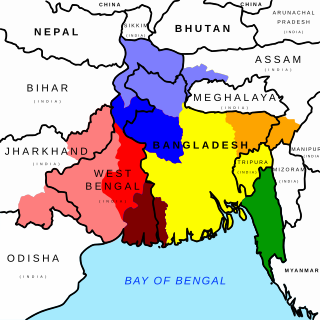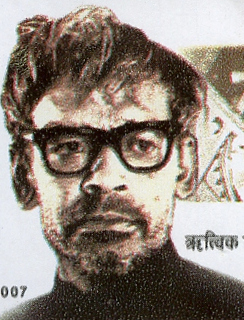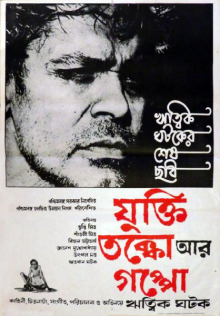
Bengali music comprises a long tradition of religious and secular song-writing over a period of almost a millennium. Composed with lyrics in the Bengali language, Bengali music spans a wide variety of styles.

Ritwik Kumar Ghatak was a noted Indian film director, screenwriter and playwright. Along with prominent contemporary Bengali filmmakers like Satyajit Ray, Tapan Sinha and Mrinal Sen, his cinema is primarily remembered for its meticulous depiction of social reality, partition and feminism. He won the National Film Award's Rajat Kamal Award for Best Story in 1974 for his Jukti Takko Aar Gappo and Best Director's Award from Bangladesh Cine Journalist's Association for Titash Ekti Nadir Naam. The Government of India honoured him with the Padma Shri for Arts in 1970.

Meghe Dhaka Tara is a 1960 film written and directed by Ritwik Ghatak, based on a social novel by Shaktipada Rajguru with the same title. It stars Supriya Choudhury, Anil Chatterjee, Gita Dey, Bijon Bhattacharya, Niranjan Roy, and Gyanesh Mukherjee. It was part of a trilogy consisting of Meghe Dhaka Tara (1960), Komal Gandhar (1961), and Subarnarekha (1962), all dealing with the aftermath of the Partition of Bengal during the Partition of India in 1947 and the refugees coping with it.

Allauddin Khan, also known as Baba Allauddin Khan was an Indian sarod player and multi-instrumentalist, composer and one of the most notable music teachers of the 20th century in Indian classical music. For a generation many of his students, across different instruments like sitar and violin, dominated Hindustani classical and became some of the most famous exponents of the form ever, including Ravi Shankar and Ali Akbar Khan.

Kumar is a title, given name, middle name, or a family name found in the Indian subcontinent, mainly in Pakistan, India, Bangladesh, Sri Lanka, and Nepal, though not specific to any religion, ethnicity, or caste. It is a generic title which variously means prince, son, boy, or chaste. It is the 11th most common family name in the world as of August 2019.

Titash Ekti Nadir Naam, or A River Called Titas, is a 1973 film that was a joint production between India and Bangladesh directed by Ritwik Ghatak. The movie was based on a novel by the same name, written by Adwaita Mallabarman. The movie explores the life of the fishermen on the bank of the Titas River in Brahmanbaria, Bangladesh.

Jukti Takko Aar Gappo is a 1974 Bengali film directed by auteur of Indian cinema Ritwik Ghatak. Jukti Takko Aar Gappo was Ritwik Ghatak's last film. The film was believed to have a cinematography way ahead of its time. The film won National Film Award's Rajat Kamal Award for Best Story in 1974.

Subarnarekha is an Indian Bengali film directed by Ritwik Ghatak. It was produced in 1962 but not released until 1965. It is a part of the trilogy that includes Meghe Dhaka Tara (1960), Komal Gandhar (1961) and Subarnarekha (1962), all dealing with the aftermath of the Partition of India in 1947 and the refugees coping with it.

The Film and Television Institute of India (FTII) is a film institute under the Ministry of Information and Broadcasting of the Government of India and aided by the Central Government of India. It is situated on the premises of the erstwhile Prabhat Film Company in Pune. It was established in 1960 and its alumni includes technicians, actors and directors in the film and television industry.
Parambrata Chattopadhyay is an Indian actor and director. Parambrata started his career with Bengali television and films. He has acted as the fictional character Topshe from Feluda under Sandip Ray's direction. He made his Hindi debut in Kahaani (2012), starring with Vidya Balan and Nawazuddin Siddiqui. His notable works include Bhalo Theko (2003), Baishe Srabon (2011), Sold (2014) directed by Jeffrey D. Brown, Kadambari (2017), Anukul (2017), Pari (2018), Ramprasad Ki Tehrvi (2019), Dwitiyo Purush(2020), Bulbbul (2020).

Cinema of West Bengal, also known as Bengali cinema or Tollywood, is an Indian film industry of Bengali-language motion pictures. It is based in the Tollygunge region of Kolkata, West Bengal, India. The origins of the nickname Tollywood, a portmanteau of the words Tollygunge and Hollywood, dates back to 1932. It was a historically important film industry, at one time the centre of Indian film production. The Bengali film industry is known for producing many of Indian cinema's most critically acclaimed global Parallel Cinema and art films, with several of its filmmakers gaining prominence at the Indian National Film Awards as well as international acclaim.
Anup is an Indian masculine given name. The Sanskrit word anūpa has the following meanings: 'watery', 'situated near the water', 'bank of a river', 'pond', 'lagoon'.The meaning of the name “Anup” is: "Incomparable, unequalled; unique; pond.
Ghatak is an Indian family name and surname found amongst Bengali Hindu Brahmins.
The 40th National Film Awards, presented by Directorate of Film Festivals, the organisation set up by Ministry of Information and Broadcasting, India to felicitate the best of Indian Cinema released in the year 1992. Ceremony took place in 1993.

Meghe Dhaka Tara is a 2013 Indian Bengali film directed by Kamaleswar Mukherjee and made under Shree Venkatesh Films banners. The film is inspired from the life and works of Bengali film director Ritwik Ghatak. The entire film is in black and white except the last scene which has been shot in colour. In this film Saswata Chatterjee plays the character of Nilkantha Bagchi and Ananya Chatterjee plays the role of Durga, Nilkantha's wife. The film was released on 14 June 2013. Besides giving an account of Ghatak's life, the film also depicts the socio-political environment of contemporary West Bengal during the Tebhaga and Naxalite movements.
Anup Singh is Geneva based filmmaker, born in Dar-Es-Salaam, Tanzania, East Africa and grew up in a Sikh family of Punjab origin.
Rita Ganguly is an exponent in the Indian classical arts. An accomplished dancer, musician and vocalist, she was honoured with the Sangeet Natak Akademi Award in 2000 and with the Padma Shri in 2003. She is the mother of actress Meghna Kothari and the of younger sister of the famous Ravindra Sangeet singer Gita Ghatak.











